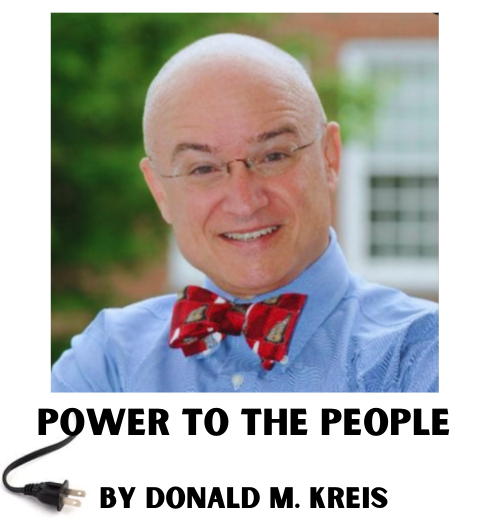Power to the People is a column by Donald M. Kreis, New Hampshire’s Consumer Advocate. Kreis and his staff of four represent the interests of residential utility customers before the NH Public Utilities Commission and elsewhere.
By DONALD M. KREIS, Power to the People
My wife and I spent a lovely week in Paris back in July and, I regret to admit, you may have helped pay for it.
No, I am not talking about the fact that my salary as New Hampshire’s Consumer Advocate is recovered from the state’s utility customers. I am, rather, referring to the fact that many Granite Staters now pay their bills with credit cards issued by Visa and Mastercard.
When I got married in 2014, I started sharing with my spouse her “United Airlines Explorer MileagePlus” Visa card. When we use our family Visa card to pay for stuff, we earn frequent flyer miles with United. We redeem the miles and take vacations in places like Paris, Barcelona, and my grandmother’s home town of Butte, Montana.
Visa, Mastercard, and the financial institutions that issue credit cards under those logos would like you to think that these frequent flyer miles, and other perks that go along with using many credit cards, are free. They are not.
Every time you use a credit card – including when you pay your bill for electricity or gas – the other party to the transaction must pay an “interchange” fee to the credit card processor. These interchange fees – sometimes called swipe fees — actually vary by credit card; the more lavish the perks associated with the card, the higher the swipe fee.
Some portion of the especially bloated interchange fees associated with cards like mine goes to the airline to pay for the miles or to whatever other company – hotels, retailers, whatever — is providing the ‘free’ benefits. Nice for me, but what about you?
Well, guess what. Those swipe fees are embedded in the prices we all pay for everything we buy. That includes electric and gas service from Eversource, Liberty, the New Hampshire Electric Cooperative or Unitil, all of which are entitled to recover these costs from customers.
Kudos to a bipartisan group of U.S. Senators — Dick Durbin of Illinois, Senator Peter Welch of Vermont, Senator Roger Marshall of Kansas, and Senator J.D. Vance of Ohio — for sponsoring the proposed Credit Card Competition Act of 2023. It’s S. 1838, for those who keep score.
The same bill is pending in the House, as H.R. 3881. The lead sponsor there is Rep. Lance Gooden, a Republican from Texas.
According to a fact sheet from Senator Durbin’s office, if the Credit Card Competition Act becomes law “the giant banks that issue the overwhelming majority of Visa and Mastercard credit cards would have to choose a second competitive network to go on each card, and then a merchant would get to choose which of those networks to use to process a transaction.”
Translation: There would be competition among credit card processing networks.
Which, in turn, would save consumers money. According to Senator Durbin’s fact sheet, “every time a Visa or Mastercard credit card is swiped, around 2-3 percent is deducted out of the transaction amount the merchant actually receives,” almost all of it going to interchange fees.
When I pay my credit card bill every month, which I do in full to avoid the exorbitant interest rates associated with credit cards, I do so out of a checking account at a local credit union. I bank exclusively with credit unions because they are not-for-profit financial institutions that are owned and ostensibly controlled by the people who use them.
You would think that consumer-owned financial institutions – credit unions – would be enthusiastic supporters of the Credit Card Competition Act in order to help their members save money. Wrong!
“This ‘big box bill’ is just another way for large merchants to squeeze more out of the American consumers’ pockets by disrupting payment systems that consumers want in place, leaving them vulnerable,” said Jim Nussle, president and CEO of the Credit Union National Association (CUNA) the day the bill was introduced.
“CUNA, state credit union Leagues, and credit unions oppose these changes to the current interchange system, and vow to protect the more than 135 million credit union members across the country who don’t deserve to suffer from a government mandate that will shift costs and risks to them,”?Nussle added.
Okay, but the Credit Card Competition Act would apply only to financial institutions with assets over $100 billion. New Hampshire’s biggest credit union, the Portsmouth-based Service Credit Union, has about $5.2 billion in assets.
So I don’t get why New Hampshire’s credit unions are falling in line with CUNA, and the banking monoliths, in opposing reforms in the credit card industry. It is especially sad given that the nation’s credit union movement began right here in New Hampshire (the oldest credit union in the U.S. being the Manchester-based St. Mary’s Bank).
Meanwhile, as Consumer Advocate I have fought and lost the battle to keep credit card swipe fees out of utility rates. Our utilities argue, credibly, that their customers want to pay their bills with Visa or Mastercard because it is so convenient.
Okay, but as the person tasked by statute with protecting the interests of New Hampshire’s residential utility customers I beg you not to use your credit card if you are having trouble paying your utility bill. Paying credit card interest on the cost of your utility bill is unnecessary when the utilities have help available to financially challenged customers.
Winter looms and, with it, utility bills that are unbearable for many. If you need help, ask your utility or your local Community Action Agency to refer you to one of the ratepayer-funded bill assistance programs. Because the last thing you want to do in an energy affordability crisis is to help other people pay for their vacations.





